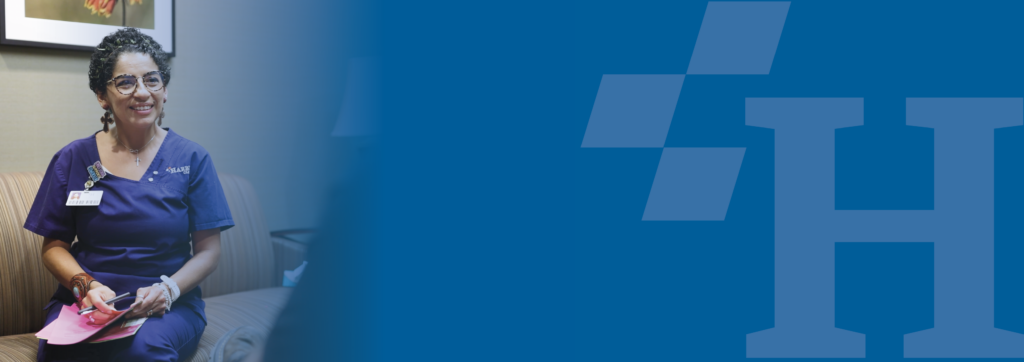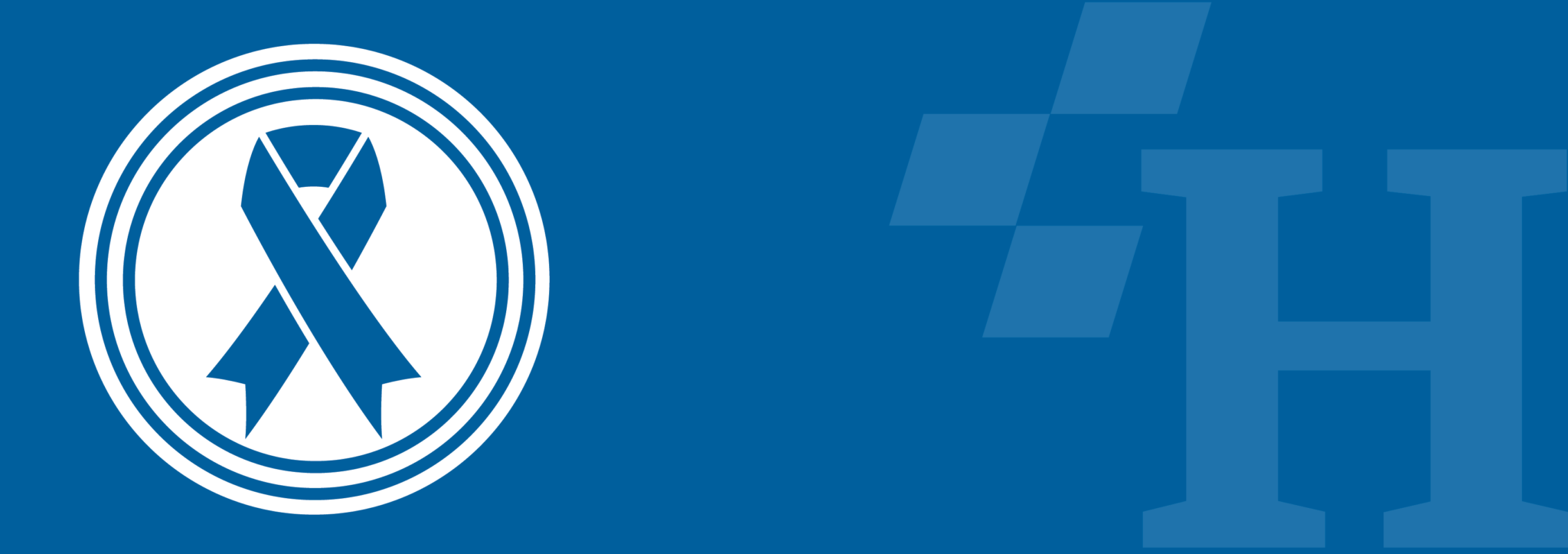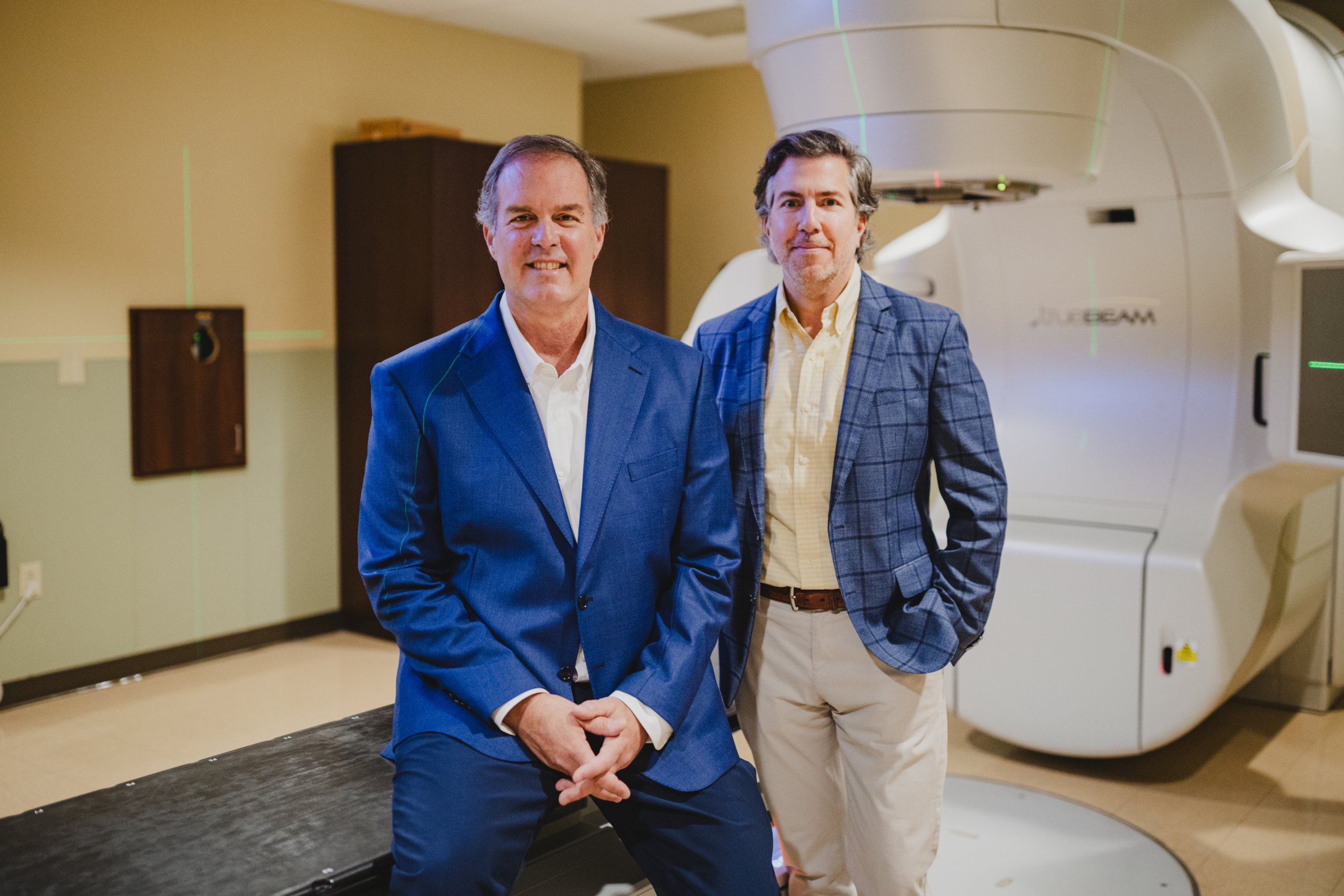New Perspective: A Medical Oncology Social Worker’s Personal Cancer Story

As a social worker for Harbin Clinic Medical Oncology, Miriam Little knew what a cancer diagnosis meant. In her role on the front lines of patient care, she helps patients and families navigate the different areas where they might need emotional support during cancer treatment. However, when faced with cancer herself, Miriam’s empathy for patients grew, as did her gratitude for the cohesive and comprehensive care she received at the Harbin Clinic Cancer Center.
In the summer of 2023, Miriam began experiencing prolonged gastrointestinal symptoms. After the birth of her children, she struggled with endometriosis complications and had a partial hysterectomy. This time, she could tell right away that these symptoms were different.
She brought her symptoms to the attention of her primary care physician and obstetrician/gynecologist (OB-GYN). Working in the cancer center, she also met with Harbin Clinic medical oncologist Dilawar Khan, MD and shared her concerns. After listening, Khan got in touch with her physicians again, and together, they worked to schedule scans and a colonoscopy with Harbin Clinic gastroenterologist Whitney Jennings, MD.
Although the colonoscopy came back clear, her scans did not. They revealed a malignant tumor and confirmed an ovarian cancer diagnosis. After sharing the scans with Harbin Cancer Center’s tumor board meeting and collaborating on a plan, OB-GYN Diana Vallecilla, MD and medical oncologists Melissa Dillmon, MD and Dr. Khan communicated with Miriam about next steps. She would need surgery and then chemotherapy. The mass was surgically removed in August 2023, and after a full recovery, Miriam began chemotherapy in October.
From Social Worker to Patient
Miriam shares that the first day she arrived at the Cancer Center to begin treatment, she did not drive to her typical spot in the staff area. Instead, she parked out front, purposely putting herself in the place of a traditional patient. She watched the educational movie and went through every step of the introductory process.
“Coming in as a patient, my mindset completely changed. I decided that on treatment days, I would leave my laptop at home. I knew I just needed to be cared for rather than being tempted to work while I was in the building,” says Miriam.
New Perspective on Treatment
As she settled into her new role, Miriam saw the place where she worked through new eyes.
“As a social worker, I’ve always known how closely the care team works to identify the right care plan. I knew it was a collaborative process but experiencing it as a patient significantly reduced my anxiety, built up my confidence and confirmed for me that I was on the right path with the right team,” says Miriam.
She underwent six treatments every three weeks, with each treatment lasting six to eight hours. The treatments became more challenging as the side effects accumulated in her body. Between treatments, she worked remotely and occasionally came in the office as her body allowed. Miriam shares that she recognized she was afforded a unique opportunity with her care team in the same building, and they could help address any symptoms and side effects she might experience while working. This allowed her to transition back into her role and focus on helping others as they went through their journey.
Now more than ever, Miriam understands the importance of her work and role in the big picture of cancer care. Being able to work and care for others gave her a sense of purpose in the middle of treatment.
On Feb. 9, 2024, Miriam finally rang the “cancer-free” bell at the Harbin Clinic Cancer Center with all her friends, family and co-workers there to celebrate.
For Ovarian Cancer Awareness Month, Miriam shares this advice:
- Listen to your body: Advocate for yourself when you feel something unusual.
- Build strong relationships: Get to know your physicians or team of caretakers.
- Take preventative measures: Make sure you’re taking preventative steps such as scheduling annual appointments.
“Today, I have a deeper level of empathy for my patients,” says Miriam. “I’m technically still a patient, and I go in for maintenance checks every three months. But now, when I say, ‘I know what you mean,’ I really do.”
Miriam’s experience is a testament to the importance of comprehensive and collaborative medical care. Learn more about the Harbin Clinic Cancer Center: https://harbinclinic.com/services/cancer-care/.
________________________________
Nueva perspectiva: la historia personal del cáncer de un trabajador social de oncología médica
El cáncer no es ajeno
Como trabajadora social de la Clínica de Oncología de Harbin, Miriam Little sabía lo que significaba un diagnóstico de cáncer. En su función de primera línea en la atención al paciente, ayuda a pacientes y familias a navegar por las diferentes áreas donde podrían necesitar apoyo emocional, financiero, y otras necesidades durante el tratamiento del cáncer. Sin embargo, cuando ella misma se enfrentó al cáncer, la empatía de Miriam por los pacientes creció, al igual que su gratitud por la atención coherente e integral que recibió en el Centro Oncológico de la Clínica Harbin.
En el verano de 2023, Miriam comenzó a experimentar síntomas gastrointestinales prolongados. Después del nacimiento de sus hijos, luchó contra las complicaciones de endometriosis y se sometió a una histerectomía parcial. Esta vez, pudo darse cuenta de inmediato que estos síntomas eran diferentes.
Ella informó sobre sus síntomas a su médico de atención primaria y a su obstetra/ginecólogo (OB-GYN). Mientras trabajaba en el centro oncológico, también se reunió con el oncólogo médico Dilawar Khan, MD y le compartió sus inquietudes. Después de escuchar, el Dr. Khan se puso en contacto nuevamente con sus médicos y juntos trabajaron para programar exploraciones y una colonoscopia con el gastroenterólogo de la Clínica Harbin, Whitney Jennings, MD.
Aunque la colonoscopia resultó clara, sus exploraciones no. Revelaron un tumor maligno y confirmaron un diagnóstico de cáncer de ovario. Después de compartir las exploraciones con la reunión de la junta de tumores del Harbin Cancer Center y colaborar en un plan, la obstetra-ginecóloga Diana Vallecilla, MD y las oncólogas médicas Melissa Dillmon, MD y el Dr. Khan se comunicaron con Miriam sobre los próximos pasos. Necesitaría cirugía y luego quimioterapia. La masa fue extirpada quirúrgicamente en agosto de 2023 y, tras una recuperación completa, Miriam comenzó la quimioterapia en octubre.
De trabajadora social a paciente
Miriam comparte que el primer día que llegó al Centro Oncológico para comenzar el tratamiento, no se estaciono en su lugar habitual en el área de personal. En lugar de eso,se estaciono enfrente, poniéndose deliberadamente en el lugar de un paciente tradicional. Vio la película educativa y repasó cada paso del proceso introductorio.
“Al llegar como paciente, mi forma de pensar cambió por completo. Decidí que los días de tratamiento dejaría mi computadora portátil en casa. Sabía que necesitaba que me cuidaran en lugar de sentirme tentada a trabajar mientras estaba en el edificio”, dice Miriam.
Nueva perspectiva sobre el tratamiento
Mientras se adaptaba a su nuevo rol, Miriam vio el lugar donde trabajaba con nuevos ojos.
“Como trabajadora social, siempre he sabido cuán estrechamente trabaja el equipo de atención para identificar el plan de atención adecuado. Sabía que era un proceso colaborativo, pero experimentarlo como paciente redujo significativamente mi ansiedad, aumentó mi confianza y me confirmó que estaba en el camino correcto con el equipo correcto”, dice Miriam.
Se sometió a seis tratamientos cada tres semanas, y cada tratamiento duró de seis a ocho horas. Los tratamientos se volvieron más desafiantes a medida que los efectos secundarios se acumulaban en su cuerpo. Entre tratamientos, trabajaba de forma remota y ocasionalmente iba a la oficina según lo permitía su cuerpo. Miriam dijo que reconoce que tuvo una oportunidad única al tener a su equipo de atención en el mismo edificio, y que podrían ayudarla a abordar cualquier síntoma y efecto secundario que pudiera experimentar mientras trabaja. Esto le permitió volver a asumir su rol y concentrarse en ayudar a otros a medida que avanzaban en su viaje.
Ahora más que nunca, Miriam comprende la importancia de su trabajo y su papel en el panorama general de la atención del cáncer. Poder trabajar y cuidar de los demás le dio un sentido de propósito en medio del tratamiento.
El 9 de febrero de 2024, Miriam finalmente tocó la campana de “libre de cáncer” en el Centro Oncológico de la Clínica Harbin con todos sus amigos, familiares y compañeros de trabajo allí para celebrar.
Para el Mes de Concientización sobre el Cáncer de Ovario, Miriam comparte este consejo:
• Escuche a su cuerpo: aboge por si mismo cuando sienta algo inusual.
• Construya relaciones sólidas: conozca a sus médicos o equipo de cuidadores.
• Tome medidas preventivas: asegúrese de tomar medidas preventivas, como programar citas anuales.
“Hoy tengo un nivel más profundo de empatía por mis pacientes”, dice Miriam. “Técnicamente sigo siendo una paciente y acudo a citas de mantenimiento cada tres meses. Pero ahora, cuando digo: “Yo te entiendo. Sé lo que quieres decir”, realmente lo sé!” La experiencia de Miriam es un testimonio de la importancia de la atención médica integral y colaborativa. Obtenga más información sobre el Centro Oncológico de la Clínica Harbin.


